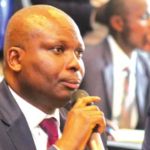For the first time in a while, the country experienced a calm weekend, devoid of the usual vibrant political activity in places of worship. This quiet period was prompted by a clear warning from the leaderless Gen-Z alliance.
Their initiative to “de-platform politicians in churches” during the first seven days of justice led the political class to adopt a low-profile approach.
Typically, weekends are filled with political engagements culminating in church services, where politicians often seek visibility and evade scrutiny. The Gen-Z alliance has criticized this practice, accusing politicians of exploiting church platforms.
President William Ruto attended a church service quietly at Lolgorian PEFA Church in Kilgoris, Narok County, without much fanfare on his social media or media appearances.
He was accompanied by Narok Governor Patrick Ole Ntutu and former Governor Samuel Tunai. Aware of the Gen-Z sentiments, their attendance was understated, with mentions of the service appearing only later in the afternoon.
“This morning, I had the privilege of welcoming the President of the Republic of Kenya, Dr William Samoei Ruto, to Narok County for a church service at PEFA Church in Lolgorian, Kilgoris Constituency. Karibu Nyumbani, Mr President,” Governor Ntutu posted around noon.
Block motorcade
An hour later, President Ruto shared, “Be diligent in these matters; give yourself wholly to them so that everyone may see your progress. – 1 Timothy 4:15. Sunday service at Pentecostal Evangelistic Fellowship of Africa (PEFA) Church in Lolgorian, Narok County.
” Shortly after, a brief video circulated, purportedly showing youth attempting to block his motorcade shortly after he departed from the church.
Meanwhile, Deputy President Rigathi Gachagua attended a church service at Deliverance Church International Kaplong in Bomet County, where he criticized leaders for displaying arrogance and opulence instead of adhering to the Kenya Kwanza Administration’s manifesto.
Gachagua affirmed his good working relationship with President William Ruto and pledged his support to the Head of State.
First Lady Rachel Ruto became the first casualty of the campaign against politicians in churches. She was compelled to cancel a planned church appearance amid warnings from the Gen-Z alliance, who had vowed to occupy all churches and prevent politicians from using church platforms for political gain.
Denied platforms
A poster outlining the action points for the seven days of justice designated Sunday to deny politicians platforms in churches. “Don’t allow any politician or RUTO to speak in your church; we shall observe a moment of silence for five minutes for our murdered comrades,” the poster read.
Planners of the campaign wrote to an Anglican priest in charge of a parish in Lavington, stating their intention to disrupt the First Lady’s planned event. “Good evening Reverend Mutahi.
I am the person who started the campaign to get rid of politicians from the church pulpit in Kenya. I see you have invited Mrs. Rachael Ruto to your church for a fundraiser. This message is to notify you that we are coming for the fundraiser. God bless you,” a publicly circulated message to Rev Mutahi read.
Similar messages were sent to different churches, warning them against hosting politicians.
This onslaught is part of a sustained campaign against politicians involved in the passage of the Finance Bill 2024, which President Ruto declined to sign following nationwide unrest that saw protesters overrun Parliament and set part of it ablaze. The sustained public protest has left the political class and government leaders in palpable fear.
Kenya Kwanza legislators, who spearheaded the passage of the bill, and Cabinet Secretaries are now visibly shaken. For instance, on Friday, Education CS Ezekiel Machogu, who was in Mombasa to grace the closing ceremony of the 47th Kenya Secondary Schools Heads Association Annual National Conference and inspect the new Mama Ngina Girls National School, chose to move discreetly without flying the national flag or using a siren on his motorcade.



